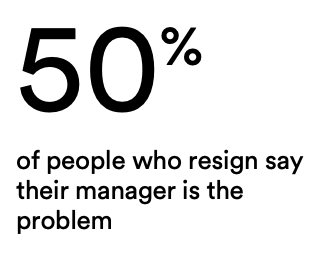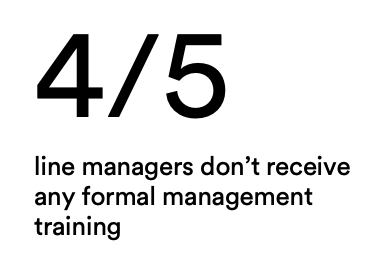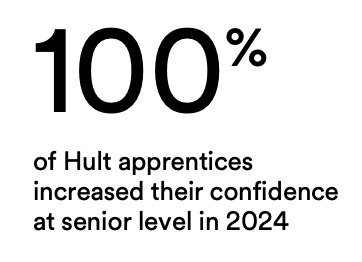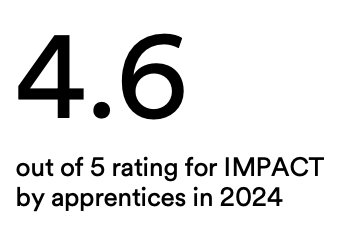Most New Line Managers Are Set Up to Fail—Here’s How to Change That
Congratulations! You’re a new line manager.
You’ve proved yourself in your current role, you’re technically skilled, you’re ready to step up, and here you are. Whether you’re called a manager, a team-leader, an in-charge or a supervisor, as soon as people report to you—you are a line manager…
The value of a good line manager
Line managers play a pivotal role in organisational success and good line management absolutely matters. The ONS has reported a link between management practices and organisational performance (ONS, 2024), backed up by (Weidmann et al’s 2024) findings that a good manager has roughly two times the positive impact on the task productivity of a good worker.
Good line managers positively impact the experience of their teams too, with organisations reporting higher levels of motivation, engagement and employee well-being, and lower levels of absenteeism and employee turnover linked to good management practices (CIPD, 2023).
Sounds great! More responsibility, more money (hopefully) and a fabulous team to manage. Your technical skills are honed; your professional experience has set you up… but how will you manage the people for whom you are now responsible?
“A good manager has roughly two times the positive impact on the task productivity of a good worker.”
New line manager = new challenges
Stepping into the role of manager is about technical skills, professional experience and industry knowledge. It’s also about managing people. It requires skills like conflict management, relationship building and supporting people to exercise their employment rights. Attributes like reliability and decisiveness and giving open and transparent feedback. Being responsible for the career development, engagement and wellbeing of others (CIPD, 2023). Those are big shoes to fill.
The cost of getting it wrong
Being a line manager can at times feel like a weighty responsibility and getting it wrong can feel like a burden. One in two people cite their line manager as their reason for exiting a business and the British Safety Council (2023) identifies workplace culture and line manager relationship as the two biggest drivers of poor wellbeing at work. Good managers hold the key to workplace productivity and wellbeing.

The problem
Given the importance and impact of good line management, it is shocking to find that four out of five new managers have not received any formal management training (CMI) and the occupational group “Managers” is least likely to have received any training in the last year (TUC, 2019).
We wouldn’t release accountants or lawyers into the wild without appropriate training, but we have no problem promoting an individual to the level of manager without providing them with proper training support. So why are we leaving new managers to sink or swim? Some organisations cite lack of funding as a key reason for failing to support managers, others cite lack of time.


The answer
Accessing levy funding to bridge the management skills gap immediately solves at least one of these problems. Additionally, the cost of the time individuals invest in management apprenticeship training can be offset by the productivity improvements good management practices bring, as well as the time and expenses saved by improvements in motivation, engagement, absenteeism and staff turnover.
There are almost ten million line managers in the UK (CIPD, 2023). Isn’t it about time we supported them to develop the skills they need?
“You’ve got the levy, so use it. We aim the Level 5 at our managers and senior managers within the business and it’s working really, really well for us.”
Kate Holland, Talent Programs Leader, Mace Construction
The benefits
CMI research suggests that managers who have received training are more likely to feel confident in their ability to lead, feel more comfortable implementing and managing change and have greater levels of trust in their team members (CMI, 2023). Improved leadership and greater levels of trust lead to benefits for both the employee and the employer; with the CIPD reporting improved wellbeing both at work and outside work for individuals with high quality managers, and staff more likely to volunteer for duties outside their job remit (CIPD, 2023). Everybody wins.
The level 5 Operations Manager Apprenticeship combines solid grounding in the technical skills associated with management, like risk assessment, financial awareness, project management and operational planning, alongside interpersonal skill building like relationship management, conflict, managing remote teams and building trust. The syllabus was built by real employers in response to the latest business problems and focuses on workplace application and real-world challenges.


The Ashridge approach to the Level 5 Apprenticeship combines self-paced study; reflective practice; live, interactive sessions and the sharing of best practice.
Open cohorts include participants from a range of organisations and sectors, allowing apprentices to build their own network of like-minded peers and learn from diverse industries and backgrounds.
Closed cohorts enable companies to develop their managers at scale and focus on the challenges unique to their organisation and industry.
A dedicated progression partner for the duration of your apprenticeships means feedback on progress and meaningful coaching conversations with a trusted partner invested in their apprentice’s progress, and a single point of contact throughout the apprenticeship.
Find out more about the Level 5 Operations Manager Apprenticeship—Ashridge Future Leaders programme.


Join our upcoming webinar with CMI
Using Levy Funding to Develop Great Line Managers
Tuesday, 22 July, 2025 at 2pm (BST)
Find Out More
References
CIPD – The importance of people management: Analysis of its impact on employees
BSC – Why line managers play a vital role in workplace wellbeing | British Safety Council
ONS – Management practices in the UK – Office for National Statistics
CMI – CMI_BMB_GoodManagment_Report.pdf
Weidmann et al – National Bureau of Economic Research_32699.pdf
TUC – Improving line management.pdf
Talk to Us



